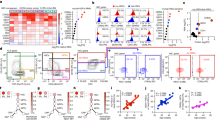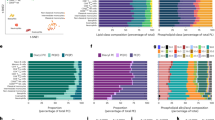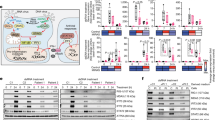Abstract
There is impressive evidence from geographical data1,2, studies in the field3 and in vitro culture work4–6 that genetically determined deficiency of glucose 6-phosphate dehydrogenase (G6PD) confers relative protection against the human malaria parasite, Plasmodium falciparum. G6PD is encoded by an X-chromosome-linked gene7, and protection phenomenon is manifested in heterozygous females who are genetic mosaics but, surprisingly, not in hemizygous males with complete deficiency8. We have shown previously that the parasite, when passaged serially through G6PD-deficient red cells, undergoes adaptive changes that gradually improve its ability to multiply in these deficient cells9. To explain the above paradox, we now show that this adaptive process is associated with, and may consist in, the induction of synthesis of a novel G6PD coded by Plasmodium falciparum.
This is a preview of subscription content, access via your institution
Access options
Subscribe to this journal
Receive 51 print issues and online access
$199.00 per year
only $3.90 per issue
Buy this article
- Purchase on Springer Link
- Instant access to full article PDF
Prices may be subject to local taxes which are calculated during checkout
Similar content being viewed by others
References
Allison, A. C. Nature 186, 531–532 (1960).
Motulsky, A. G. Hum. Biol. 32, 28–62 (1960).
Luzzatto, L., Usanga, E. A. & Reddy, S. Science 164, 839–842 (1969).
Friedman, M. J. Nature 280, 245–247 (1979).
Luzzatto, L. in Modern Genetic Concepts and Techniques in the Study of Parasites, 257–277 (Tropical Diseases Research Series No. 4, Schwabe & Co., Basel, 1981).
Roth, E. F., Raventos-Saurez, C., Rinaldi, A. & Nagel, R. L. Proc. natn. Acad. Sci. U.S.A. 80, 298–299 (1983).
Beutler, E. in The Metabolic Basis of Inherited Disease (eds Stanbury, J. B., Wyngaarden, J. B., Fredrickson, D. S., Goldstein, J. L. & Brown, M. S.) 1629–1653 (McGraw-Hill, New York, 1983).
Bienzle, U., Ayeni, O., Lucas, A. O. & Luzzatto, L. Lancet i, 107–110 (1972).
Luzzatto, L., Sodeinde, O. & Martini, G. Ciba Fdn. Symp. 94, 159–173 (1983).
Trager, W. & Jensen, J. B. Science 193, 673–675 (1976).
Theakston, R. D. G. & Fletcher, K. A. Life Sci. 13, 405–410 (1973).
Theakston, R. D. G., Fletcher, K. A. & Moore, G. A. Ann. trop. Med. Parasit. 70, 125–127 (1976).
Hempelmann, E. & Wilson, R. J. M. Molec. biochem. Parasit. 2, 197–204 (1981).
De Flora, A. et al. Biochim. biophys. Acta 500, 109–123 (1977).
Guggenmoos-Holzmann, I., Bienzle, E. & Luzzatto, L. Int. J. Epidemiol. 10, 16–22 (1981).
WHO tech. Rep. Ser. 366, 30–32 (1967).
Saul, A., Myler, P., Elliot, T. & Kidson, C. Bull. Wld Hlth Org. 60, 755–759 (1982).
Lambros, C. & Vanderberg, J. J. Parasit. 63, 418–420 (1979).
Pasvol, G., Wilson, R. J. M., Smalley, B. J. & Brown, J. Ann. trop. Med. Parasit. 72, 87–88 (1978).
Rattazzi, M. C., Bernini, L. F., Fiorelli, G. & Mannucci, P. M. Nature 213, 79–80 (1967).
Author information
Authors and Affiliations
Rights and permissions
About this article
Cite this article
Usanga, E., Luzzatto, L. Adaptation of Plasmodium falciparum to glucose 6-phosphate dehydrogenase-deficient host red cells by production of parasite-encoded enzyme. Nature 313, 793–795 (1985). https://doi.org/10.1038/313793a0
Received:
Accepted:
Issue Date:
DOI: https://doi.org/10.1038/313793a0
This article is cited by
-
Genotypic and phenotypic characterization of G6PD deficiency in Bengali adults with severe and uncomplicated malaria
Malaria Journal (2017)
-
Association of glucose-6-phosphate dehydrogenase deficiency and malaria: a systematic review and meta-analysis
Scientific Reports (2017)
-
The influence of host genetics on erythrocytes and malaria infection: is there therapeutic potential?
Malaria Journal (2015)
-
The complexities of malaria disease manifestations with a focus on asymptomatic malaria
Malaria Journal (2012)
-
Allelic heterogeneity of G6PD deficiency in West Africa and severe malaria susceptibility
European Journal of Human Genetics (2009)
Comments
By submitting a comment you agree to abide by our Terms and Community Guidelines. If you find something abusive or that does not comply with our terms or guidelines please flag it as inappropriate.



